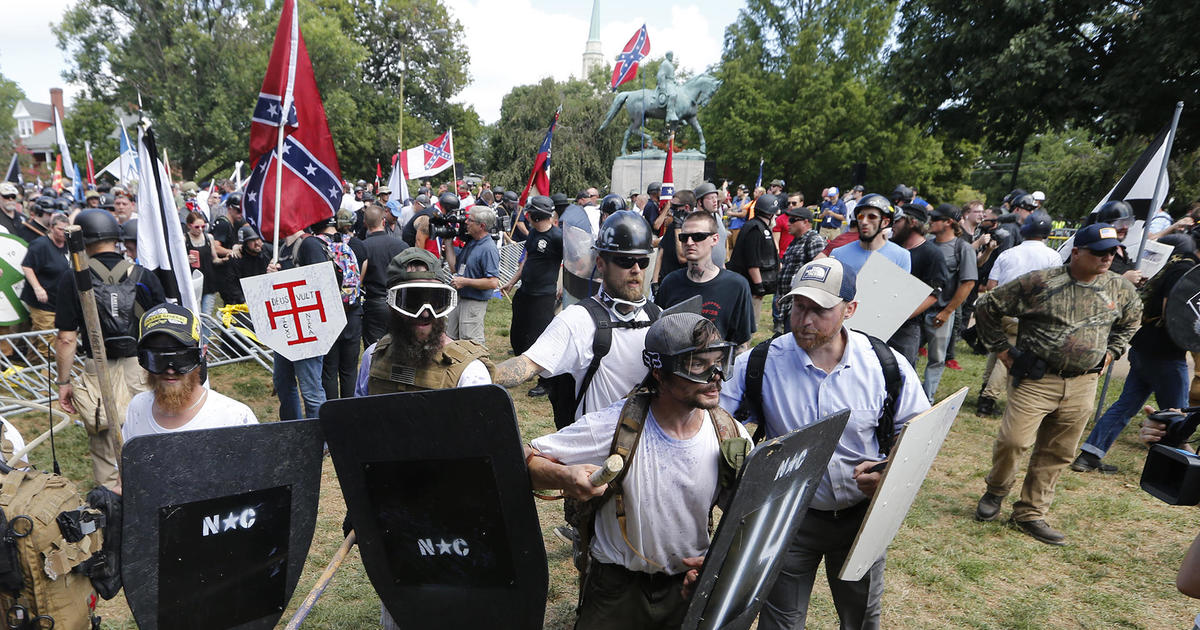
The plaintiffs in a civil trial against two dozen organizers of a white nationalist protest in Charlottesville in 2017 "continue to carry around the pain and trauma of Charlottesville" four years later, their lawyer said in opening arguments Thursday.
That trauma centers, in part, around the actions of James Alex Fields, Jr., now serving a life sentence for deliberately plowing his car into a crowd of people. He killed counter-protester Heather Heyer, 32, and injured dozens of others, including four plaintiffs, according to the lawsuit.
Plaintiffs include city residents and counter-protesters who sustained injuries following violent clashes that broke out around their campus and city.
Among them is Marcus Martin, a landscaper who underwent surgery after his leg and ankle were crushed by Fields' car. Martin was able to get his fiancée and co-plaintiff Marissa Blair out of the way, but it wasn't until he arrived at the hospital that he learned Heyer, a close friend of the couple, had not survived.
Plaintiffs' attorney Roberta Kaplan told the jury about UVA student Natalie Romero, who woke up in the hospital and asked if she'd ever walk again. Charlottesville resident Thomas Baker can't go on runs anymore, Kaplan said. He still suffers from panic attacks.
Liz Sines narrowly escaped injury when Fields' car hit protesters. "I don't think I'll ever not be scared," she told CBS News in December 2020. "I heard screams. I heard this awful sound. I don't know how I got out of the way."
"You're going to hear them tell you about some of the very worst moments of their lives," Kaplan said of the plaintiffs as she addressed the jury. "It will be very difficult" for them, Kaplan said.
Represented by attorneys with the nonprofit Integrity First for America, the plaintiffs are seeking compensatory and statutory damages for physical and emotional injuries they say they've endured in the months and years since the protests. The lawsuit does not indicate an exact price sought for damages.
"This case is a case about violence and intimidation that was planned for a month and culminated in a tragic and violent weekend," Karen Dunn, another lawyer representing the plaintiffs, told the jury in her opening remarks before queuing up video of neo-Nazis and white supremacists chanting.
On a screen inside the courtroom, familiar images of neo-Nazis donning fire-lit tiki torches played out, once more. "You will not replace us. Jews will not replace us. Blood and Soil. Blood and soil," marchers screamed, as scenes from the storming of the University of Virginia campus the night before the deadly rally.
Dunn outlined a series of messages swapped by planners via text, email and the gaming app Discord — exchanges that she said showed violent intent. In the messages, the defendants described the use of flag poles, shields and cars as weapons.
"We're raising an army my liege," Charlottesville resident and rally organizer Jason Kessler wrote to white nationalist leader Richard Spencer ahead of the rally. "For free speech, but the crack in of skulls if it comes to it."
Kessler's counsel, James Kolenich, argued that online communications offered up by the plaintiffs' lawyers are protected under the First Amendment.
"If the First Amendment doesn't defend the most disgusting speech, then it doesn't defend anything," Kolenich said.
Not everyone showed up in court. Defendant Robert "Azzmador" Ray — a notorious neo-Nazi writer for the Daily Stormer is currently missing. He faces an arrest warrant for contempt of court in the case.
"We are now here four years after the event," said Spencer in his opening statement, representing himself. "Emotions have subsided and we are in a position to revisit the matter, look on it with clear eyes and apply the law accurately and fairly."
Spencer said his statements ahead of the rally were "tough talk" but conceded that he did house "certain regrets about being involved with the rally." The defendant told the jury that this case "isn't about Donald Trump."
"The defendants of this case may want to focus on politics," Dunn told the jury. "But that is not what the plaintiff's case is about. Our case is about the planning, execution and celebration of racially motivated violence."
But the verdict could ultimately create political waves. Known as the "KKK Act," plaintiffs are relying on a statute enacted in 1871 and designed to protect African Americans from the Ku Klux Klan and other hate groups — a move that could implicate former President Trump, Steve Bannon, Rudy Giuliani and others who have been accused of inspiring violence ahead of the January 6 attack on the U.S. Capitol.
"Capitol Police are now using that very same statute to bring their own lawsuits following January 6," said Amy Spitalnick, executive director of Integrity First America. "The KKK Act is sadly having a renaissance or resurgence in the year 2021 because we're living in a moment where violent extremism, violent white supremacy is also having a resurgence. But it should also be a reminder that we have to take action."
"later" - Google News
October 29, 2021 at 10:32AM
https://ift.tt/3Cs9XNR
Four years later, organizers of white supremacist protest take stand in civil trial - CBS News
"later" - Google News
https://ift.tt/2KR2wq4
Bagikan Berita Ini














0 Response to "Four years later, organizers of white supremacist protest take stand in civil trial - CBS News"
Post a Comment